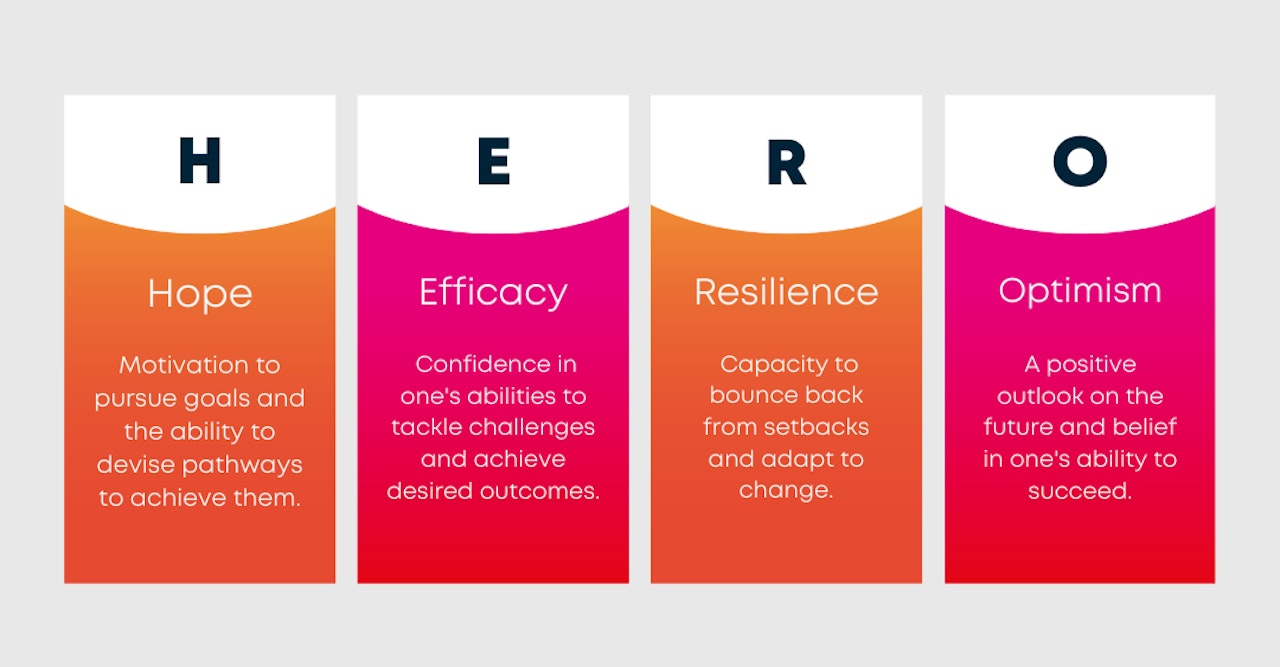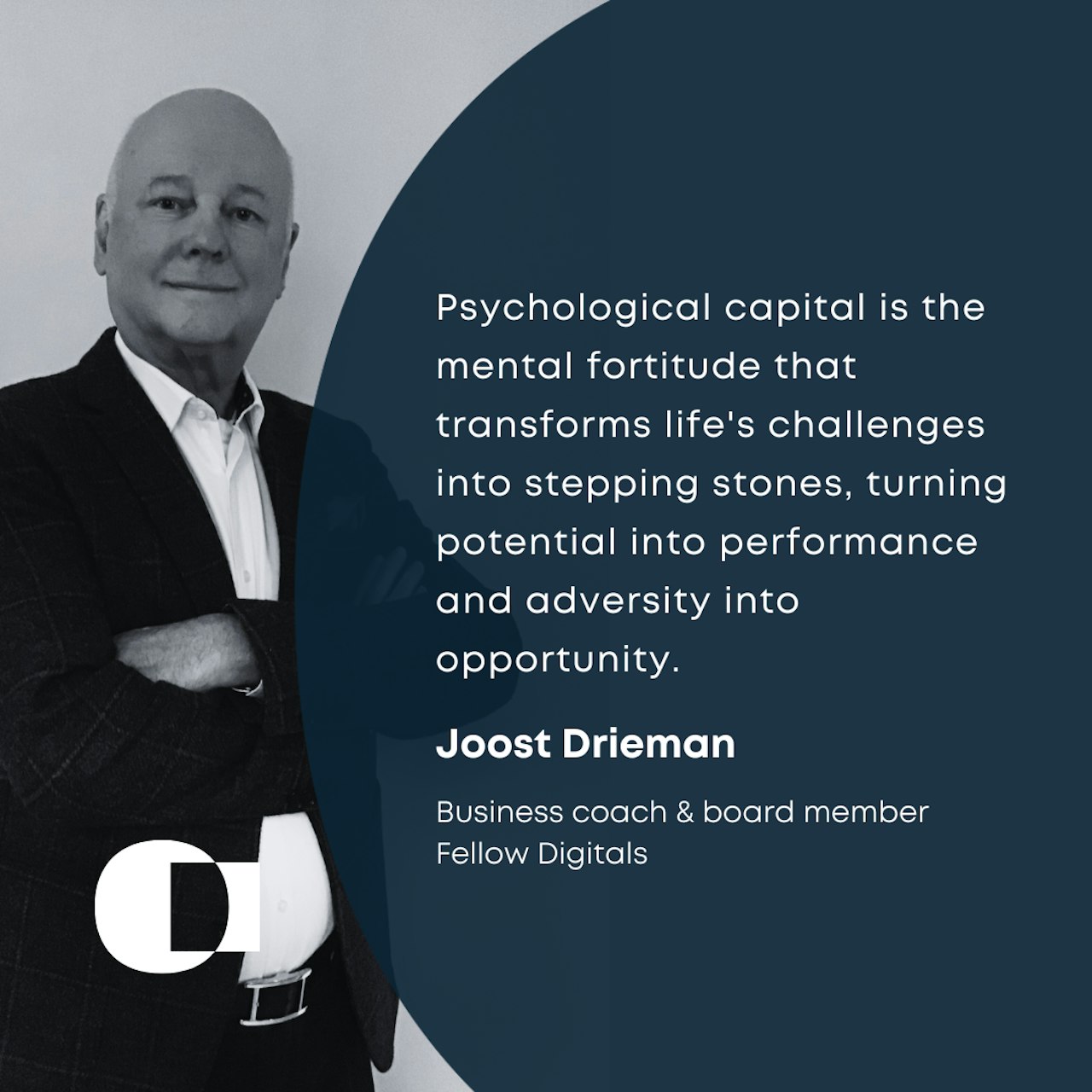Unlocking psychological capital: A pathway to success and well-being
Blog | Joost post series #10

Welcome to our ongoing series on "Building a healthy work environment" where Joost Drieman, a seasoned senior coach and business advisor, shares insights into enhancing workplace dynamics. In this episode, we delve into Psychological Capital (PsyCap) – a critical element for achieving personal and professional success amidst today's fast-paced and often challenging world.
What is psychological capital and why does it matter?
Psychological capital, coined by Professor Fred Luthans in 2006, refers to our positive psychological state that fuels performance and well-being. Just as financial capital supports us in times of economic need, PsyCap equips us with mental resources to thrive during adversity and uncertainty.
PsyCap comprises four key components, collectively known as HERO:
Hope: Motivation to pursue goals and the ability to devise pathways to achieve them.
Efficacy: Confidence in one's abilities to tackle challenges and achieve desired outcomes.
Resilience: Capacity to bounce back from setbacks and adapt to change.
Optimism: A positive outlook on the future and belief in one's ability to succeed.

Let's explore each component further to understand how they contribute to personal growth and organizational success.
Hope: Setting goals and finding pathways
Hope involves setting clear goals, envisioning success, and identifying pathways to achieve those goals. It fosters persistence and adaptive thinking, crucial for overcoming obstacles and achieving long-term success.
Efficacy (self-efficacy): Belief in one's abilities
Self-efficacy drives individuals to take on challenging tasks, persist in the face of adversity, and achieve desired outcomes. It is built through mastery experiences, social modeling, persuasion, and managing psychological responses.
Resilience: Bouncing back and adapting
Resilience enables individuals to recover quickly from setbacks, adapt to change, and maintain performance and well-being under pressure. It includes adaptability, effective coping strategies, strong support systems, and a positive mindset.
Optimism: A positive outlook
Optimism fuels motivation, enhances resilience, and promotes proactive behavior. It involves interpreting events positively, maintaining gratitude, and believing in the potential for success despite challenges.
Integrating HERO with organizational strategies
Psychological Capital (PsyCap) is not just a personal attribute; it also plays a crucial role in shaping organizational effectiveness and resilience. When organizations prioritize the development of PsyCap among their employees, they align individual strengths with strategic goals, fostering a positive organizational culture and enhancing overall performance.
1. Talent development and retention: Organizations that invest in PsyCap empower employees to build essential skills such as resilience, optimism, and self-efficacy. These qualities are not only beneficial for individual growth but also contribute to talent retention. Employees who feel supported and encouraged to develop their PsyCap are more likely to stay engaged and committed to the organization.
2. Employee engagement and satisfaction: PsyCap enhances employee engagement by creating a supportive environment where individuals feel valued and capable of overcoming challenges. Engaged employees are more productive, innovative, and willing to contribute positively to team dynamics and organizational goals. By promoting a positive psychological state, organizations can boost overall job satisfaction and reduce turnover rates.
3. Organizational resilience and adaptability: In today's dynamic business environment, organizational resilience is essential for navigating uncertainties and adapting to change. PsyCap equips employees with the mental agility and emotional resilience needed to cope with setbacks, learn from failures, and embrace new opportunities. Organizations that cultivate a resilient workforce are better positioned to thrive amidst challenges and drive sustainable growth.
4. Leadership effectiveness: Leaders who embody PsyCap principles inspire trust, motivate their teams, and foster a culture of openness and innovation. They demonstrate authentic optimism, provide constructive feedback, and empower employees to take initiative and ownership of their work. Effective leadership that promotes PsyCap contributes to cohesive teams, effective communication, and strategic alignment across the organization.
5. Organizational culture and well-being: By integrating PsyCap into organizational strategies, companies can cultivate a positive workplace culture that prioritizes employee well-being and mental health. A supportive culture encourages open communication, mutual respect, and collaboration, which are foundational elements for creating a psychologically safe environment where employees can thrive personally and professionally.
Practical implementation:
Organizations can implement PsyCap initiatives through various strategies:
· Training and development programs: Offer workshops, coaching sessions, and online courses that focus on building PsyCap skills such as resilience-building exercises, mindfulness practices, and goal-setting techniques.
· Performance management: Incorporate PsyCap assessments into performance evaluations to recognize and reinforce positive behaviors and achievements aligned with organizational values.
· Leadership development: Provide leadership training that emphasizes the importance of PsyCap in effective leadership, including emotional intelligence, communication skills, and conflict resolution strategies.
By strategically integrating PsyCap into talent management, leadership development, and organizational culture initiatives, companies can create a resilient, engaged workforce capable of driving sustained success and adapting to future challenges effectively.
The golden nugget for optimizing psychological capital
In today's information-rich environment, leveraging a robust Learning Management System (LMS) can optimize PsyCap. It offers tailored training modules and resources that empower employees to enhance their psychological resources effectively.
Practical tip: Cultivate a growth mindset
Embrace a growth mindset, believing that abilities and intelligence can be developed through effort, learning, and perseverance. This mindset supports continuous improvement and resilience.
Conclusion
Investing in your psychological capital is not just advantageous but essential for achieving sustainable success and personal fulfillment. By understanding and cultivating PsyCap, individuals and organizations can navigate challenges more effectively, foster a positive work environment, and enhance overall well-being.

We love to share our knowledge with you
Related blogs



